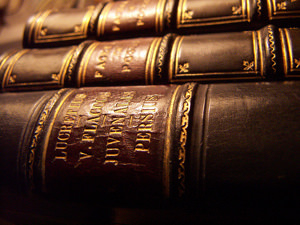Back to the Dawn of the Modern World
Harvard professor and author Stephen Greenblatt won a Pulitzer Prize this week for his account of how an ancient Roman philosophical epic jump-started the modern world.
Harvard professor and author Stephen Greenblatt won a Pulitzer Prize this week for his account of how an ancient Roman philosophical epic jump-started the modern world.
“The Swerve” tells the story of the role that poet-philosopher Lucretius’ “On the Nature of Things” played in the Renaissance, a three-century, cross-cultural explosion of the intellect that pulled Europe out of the Dark Ages. The poem argued for a godless universe and against religion and superstition in the name of humanism and prefigured modern atomic theory with the notion that matter was composed of tiny, indivisible particles that “swerve” and collide. –ARK
Your support matters…Harvard Gazette:
Once thought lost, the poem was rediscovered on a library shelf in the winter of 1417 by a Poggio Bracciolini. The copying and translation of the book fueled the Renaissance, inspiring artists such as Botticelli and thinkers such as Giordano Bruno; shaped the thought of Galileo and Freud, Darwin and Einstein; and had a revolutionary influence on writers such as Montaigne and Shakespeare and even Thomas Jefferson.
Greenblatt’s book argues that the influence of Lucretius’ work washed over modern thought like a tidal wave, anticipating not only social thought, but whole branches of modern science.
“It argues that the universe consists of atoms, void, and nothing else,” Greenblatt explained earlier this year at the third in a series of book talks given by Harvard faculty and alumni as part of Wintersession programming. “The atoms are eternal and always moving. Everything comes into existence simply because of the random movement of atoms, which, given enough time, will form and reform, constantly experimenting with different configurations of matter from which will eventually emerge everything we know, and into which everything we know will collapse.”
Independent journalism is under threat and overshadowed by heavily funded mainstream media.
You can help level the playing field. Become a member.
Your tax-deductible contribution keeps us digging beneath the headlines to give you thought-provoking, investigative reporting and analysis that unearths what's really happening- without compromise.
Give today to support our courageous, independent journalists.






You need to be a supporter to comment.
There are currently no responses to this article.
Be the first to respond.